With some reluctance, we must leave the comfort and pleasures of the river valley of Nong Khiaw and resume our little tour of Laos – so we’ll retrace our steps back to Luang Prabang and Vientiane and head to the south of the country – Si Phan Don – the four thousand Islands – the widest (25 miles in the rainy season) stretch of the Mekong River on its 2,700 mile journey from the Tibetan Plateau to the South China Sea.
Our hospitable Canadian host at the Viewpoint Hotel is going to Luang Prabang to renew his residency visa and he’s offered us a lift in a private van. What a delightful chap! It’s our most comfortable three hour van ride in over two months and we’re dropped off right outside our accommodation. Luang Prabang seems considerably busier since our last visit. We spend just one night here then a nine hour sleeper bus to Vieniane where we are unable to check into our hotel till lunchtime so to pass the morning we go for slightly risky haircuts – proper salon though, hair wash, head massages, bowls of fruit – Jo’s is not quite a pixie style, mine is definitely Thomas Shelby of Peaky Blinders – total outlay £20 – and not the disaster it could have been.
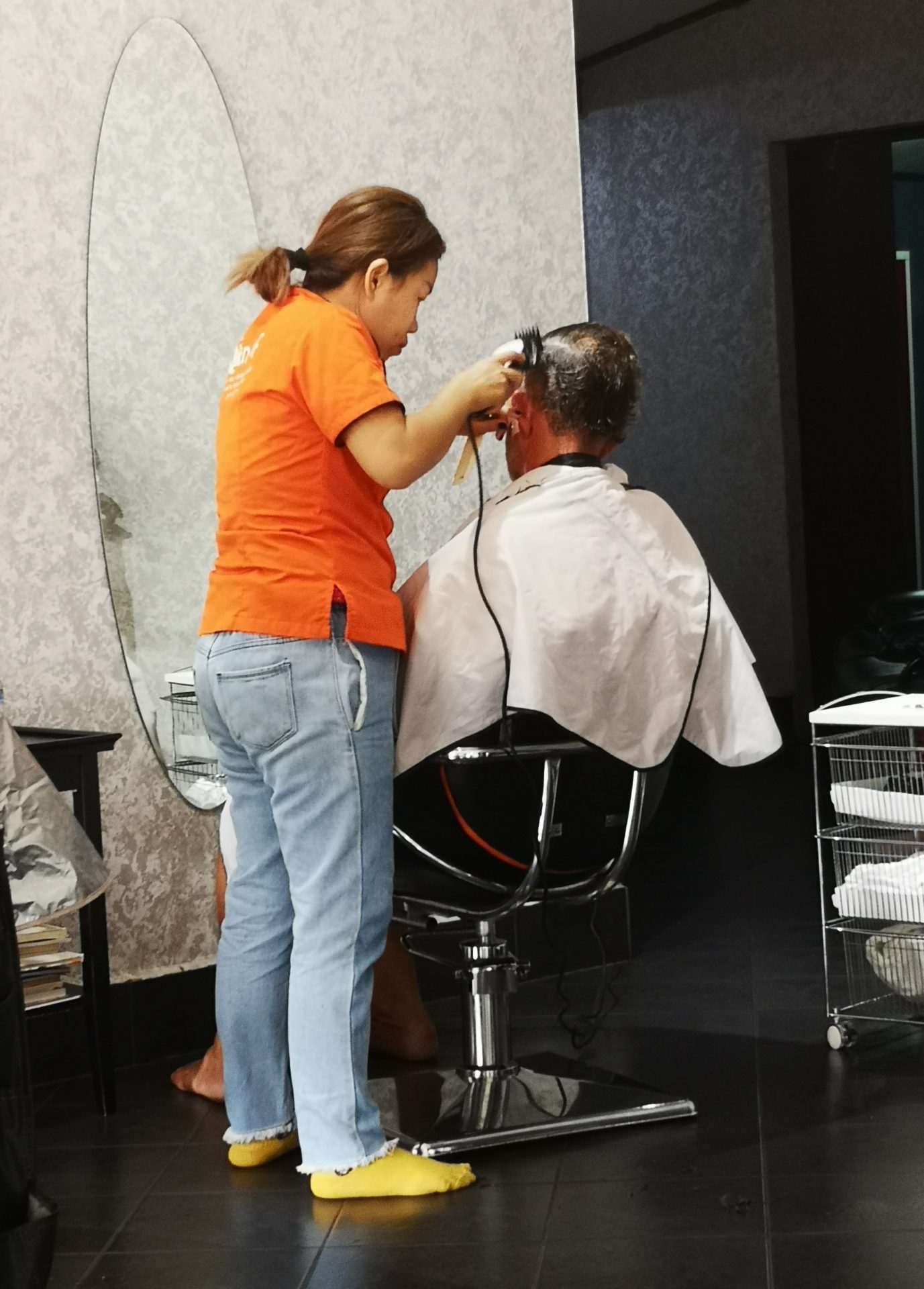
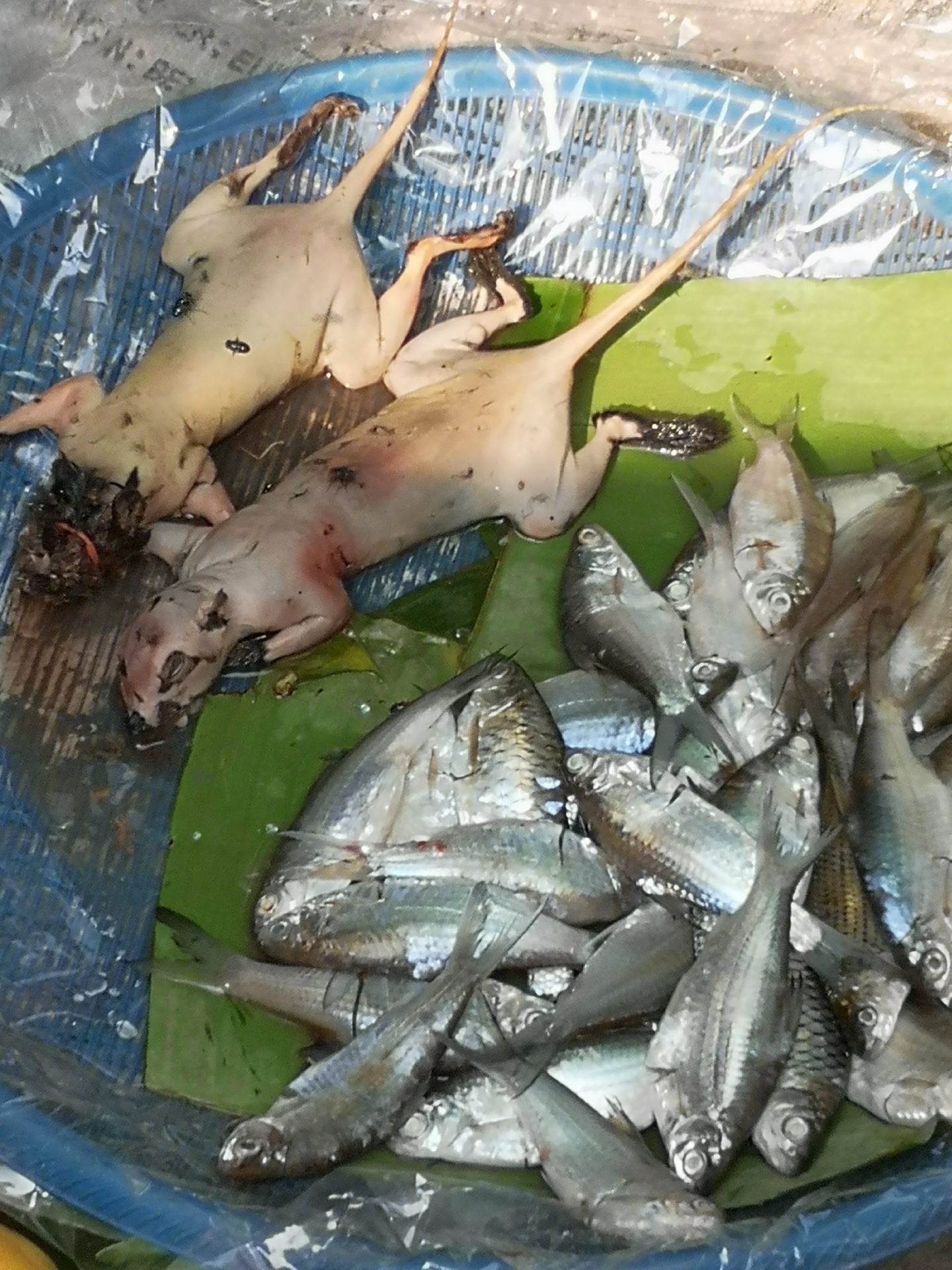
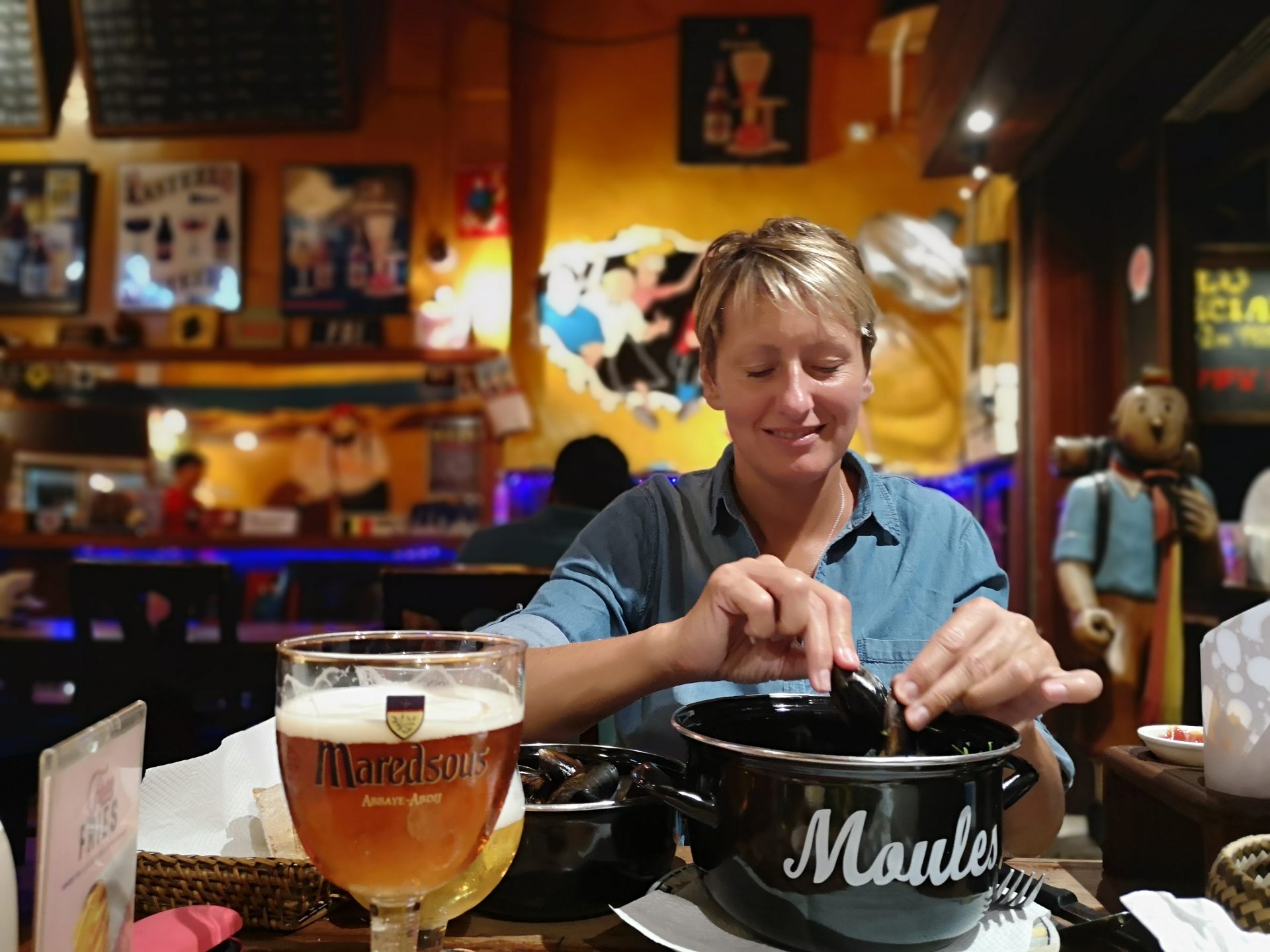
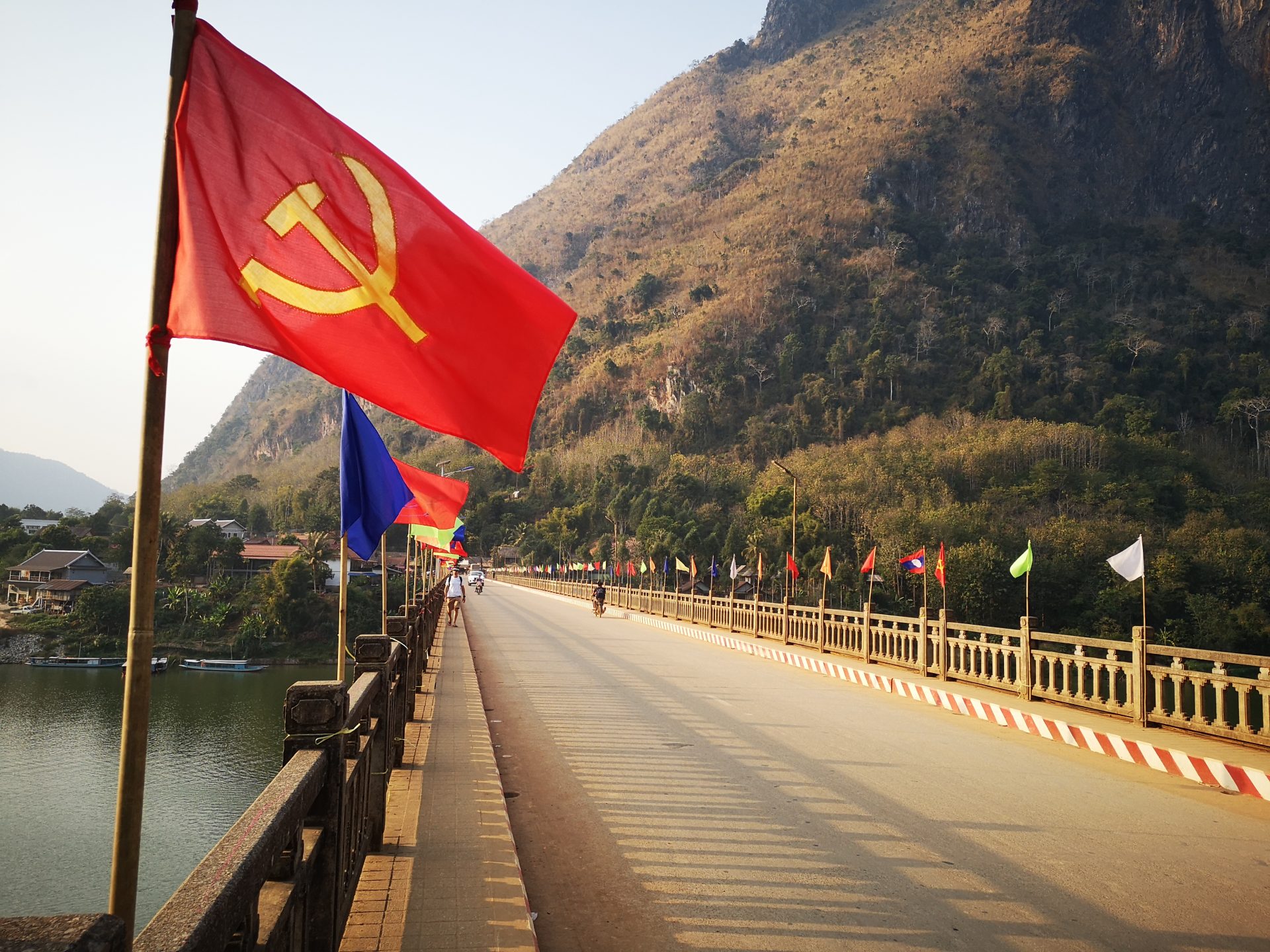
A Dodgy Haircut?
The Belgian Cafe Vientiane
Roast Rat Anybody?
The Bridge at Nong Khiaw
As tomorrow is another endurance ten hour bus ride to Pakse in the south, we spoil ourselves in Vientiane at the Belgian Cafe where we splurge out on our most expensive meal thus far: excellent Chilean mussels, a proper beefburger and three (or four) Maredsous Abbey beers. A dinner fit for long distance bus riders. We meet a delightful Belgian woman, Annie, from Ghent and her Australian lawyer partner, Mike who practices law in Laos. He has some fascinating insights into the ways of the country. Annie was one of those enterprising young travellers in the early 1970s who travelled to Iran in a campervan.
We slumber by the pool the following day before our pickup to the bus station and the final long bus ride south to the town of Pakse. It’s a decent bus but we have a problem. The sleeping compartment allocated to us is at the very front of the bus and it’s little more than five feet long – I’m six feet tall – so I can’t lie down. The remaining compartments are almost six feet so perfect for me. I’ve paid for a sleeper bus so I’m not happy. The bus is almost loaded and ready to go but I’m outside making a fuss. Nobody’s interested. No no no they all say even though they don’t know what my problem is. Go ticket office somebody says – I tell Jo not to leave without me and go ticket office. Initially they’re not interested either. I insist on speaking with a boss and get somebody on the phone. I’m issued with new tickets but back at the bus my newly allocated seats are occupied and the incumbents won’t move – why should they. Back to the ticket office, more phone calls. I’m now being a real pain in the ass. I get shown to another bus where a four person compartment is free at the back. Will anybody be joining us here? I ask, maybe later says the attendant. Great! I’m fond of my Laos brothers and sisters but I !don’t want to sleep with them. I return to the original bus that is now reversing out of its bay. Jo is at the door shouting at me to board. I know if I board I’ve lost the argument, but the driver looks like he’ll happily go without me. I stall! Get on the bus shouts Jo. Reluctantly I board. But Jo ultimately saves the day by bribing two guys five pounds each to swap beds with us. I call it a bribe, Jo calls it, tether pompously I think, a mutually beneficial negotiation. Everybody is happy.
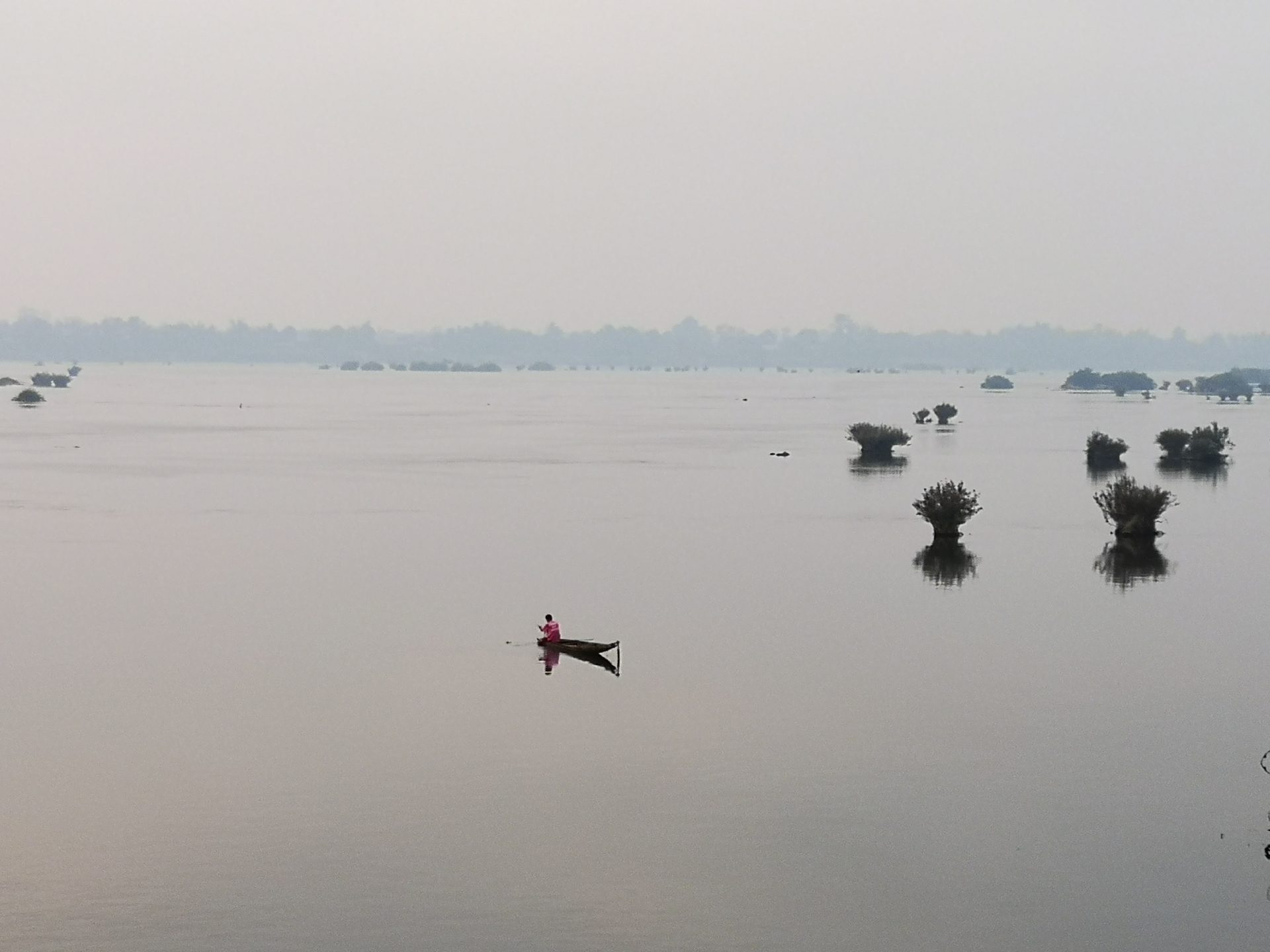
An open sided van with two benches down either side (called a sorngtaaou – literally meaning two rows) takes us from the southern town of Pakse alongside the Mekong river to the head of the 4000 islands at Champasak, the location of an ancient Khymer temple that we wish to visit. The van is very entertaining. We join it at the market where women and their children are squashed in amongst bags of milk, mangos, cucumbers, morning glory, cabbages red, cabbages white, noodles, oranges, beansprouts, trays of eggs and a tall fridge freezer strapped at the rear. The van driver is a man with superb community spirit. He knows everybody, knows where they live and he’s memorised their shopping bags. Some of these women are stall holders and they’ve bought wholesale at market so a bag of mangoes is sixty mangoes! Our route to the village of Champasak skirts the wide Mekong River with a slowly increasing number of islands. We’ve been travelling overnight for about fifteen hours. We will rest in the Nakorn River hotel for a couple of days before slowly meandering further down and across the Mekong.
I receive news that an old friend, Rick has died of a rare bladder cancer. He was my age and leaves three young daughters. It’s extremely sad and he’s on my mind throughout the day. We hire a motorbike and ride out to Wat Phu, the ancient temple of the mountain. Dating back to the 5th Century it predates Angkor Wat in Cambodia. Much smaller than Angkor Wat, most of the remaining tumbledown pavilions date from the 11th and 12th centuries. The atmospheric setting on the slopes of the mountain amongst avenues of gnarled frangipani trees is beautiful. And – for me this is so important – there are very few visitors so it is a real pleasure to be here. But there are thousands of plastic bottles and rubbish strewn about the site. I scramble down a slope to collect a load and deposit them in a bin. I spot a small group of women who notice what I’m doing – and they’re giggling amongst themselves as if I’m quite mad. I feel self righteous and think I might start a trend. Twenty minutes later at the base of the temple, set slightly away from the main path, I discover a mountainous dump of plastic bottles and rubbish onto which the bins are occasionally emptied. There is no rubbish collection from this UNESCO world heritage site. Of course it’s all about money – it costs a lot to collect and properly dispose of rubbish. It’s not a priority and people are used to living amongst trash. That’s why the women think I’m bonkers – I’m not clearing up, I’m just moving rubbish around!
Our hotel by the Mekong is very peaceful and were amongst an older crowd – Jo calls it the banana pancake trail for wrinklies. There are older single female travellers – French and German – some of them quite stern, overbearing and bloody rude to the locals.
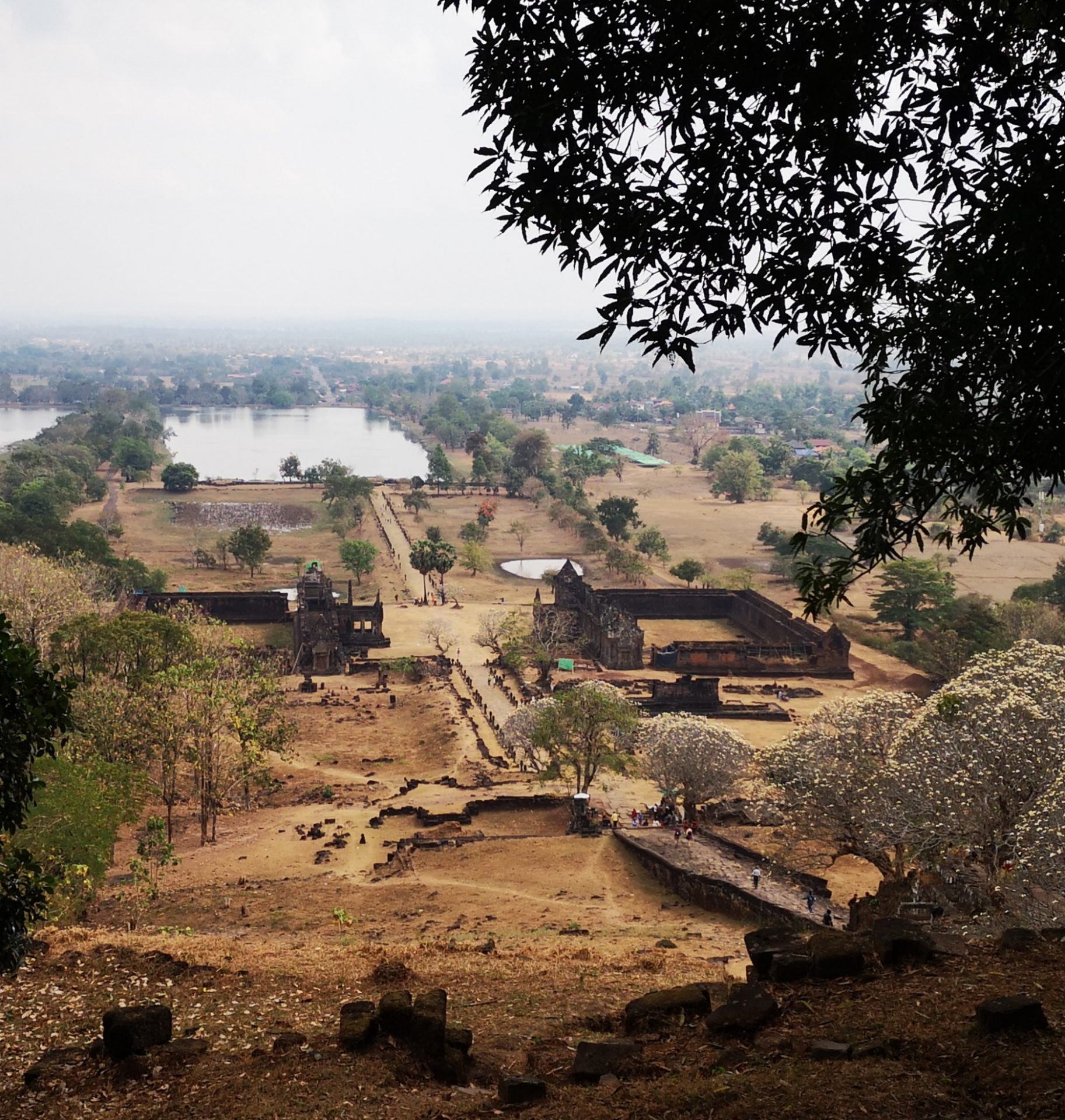
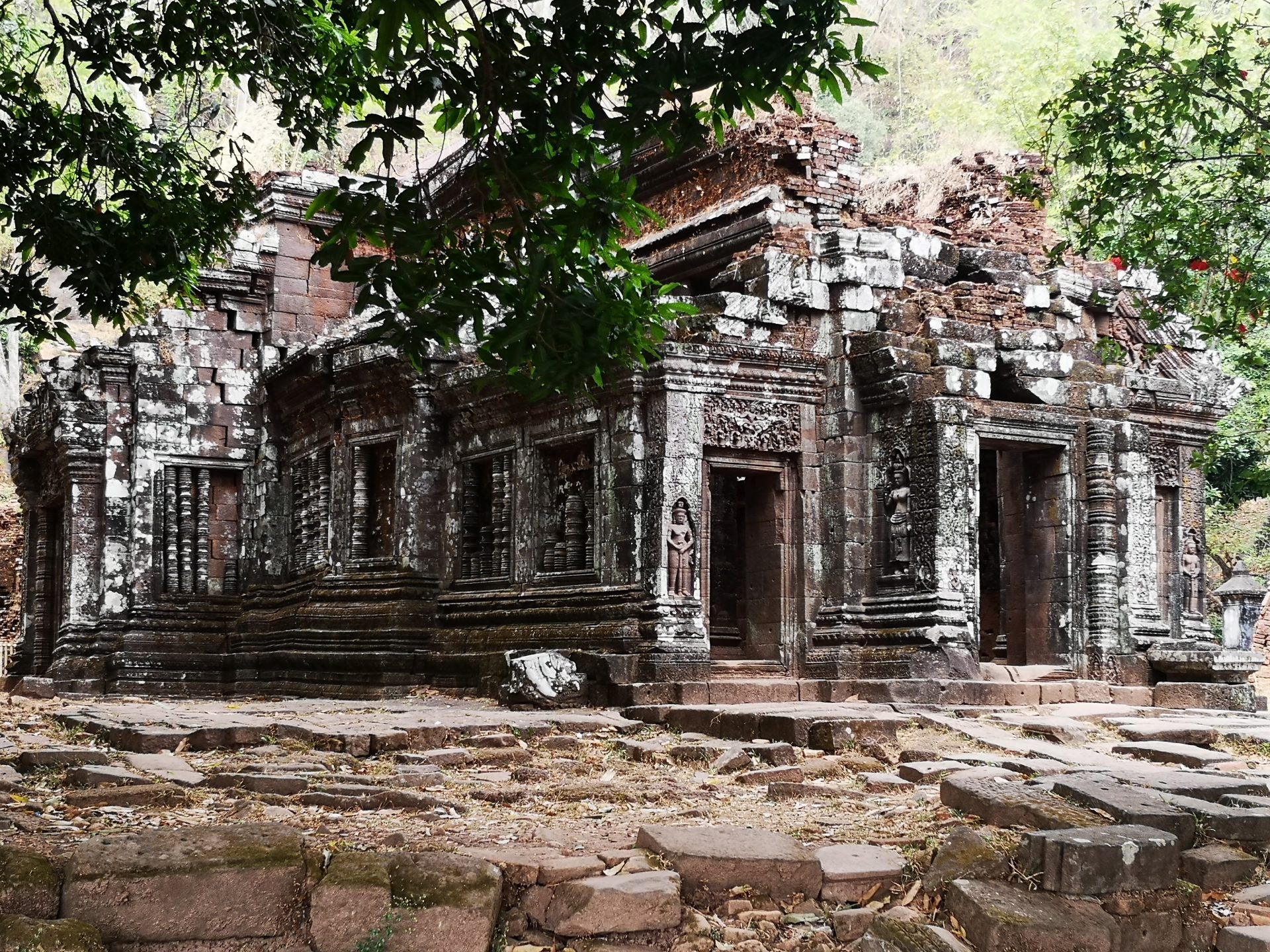
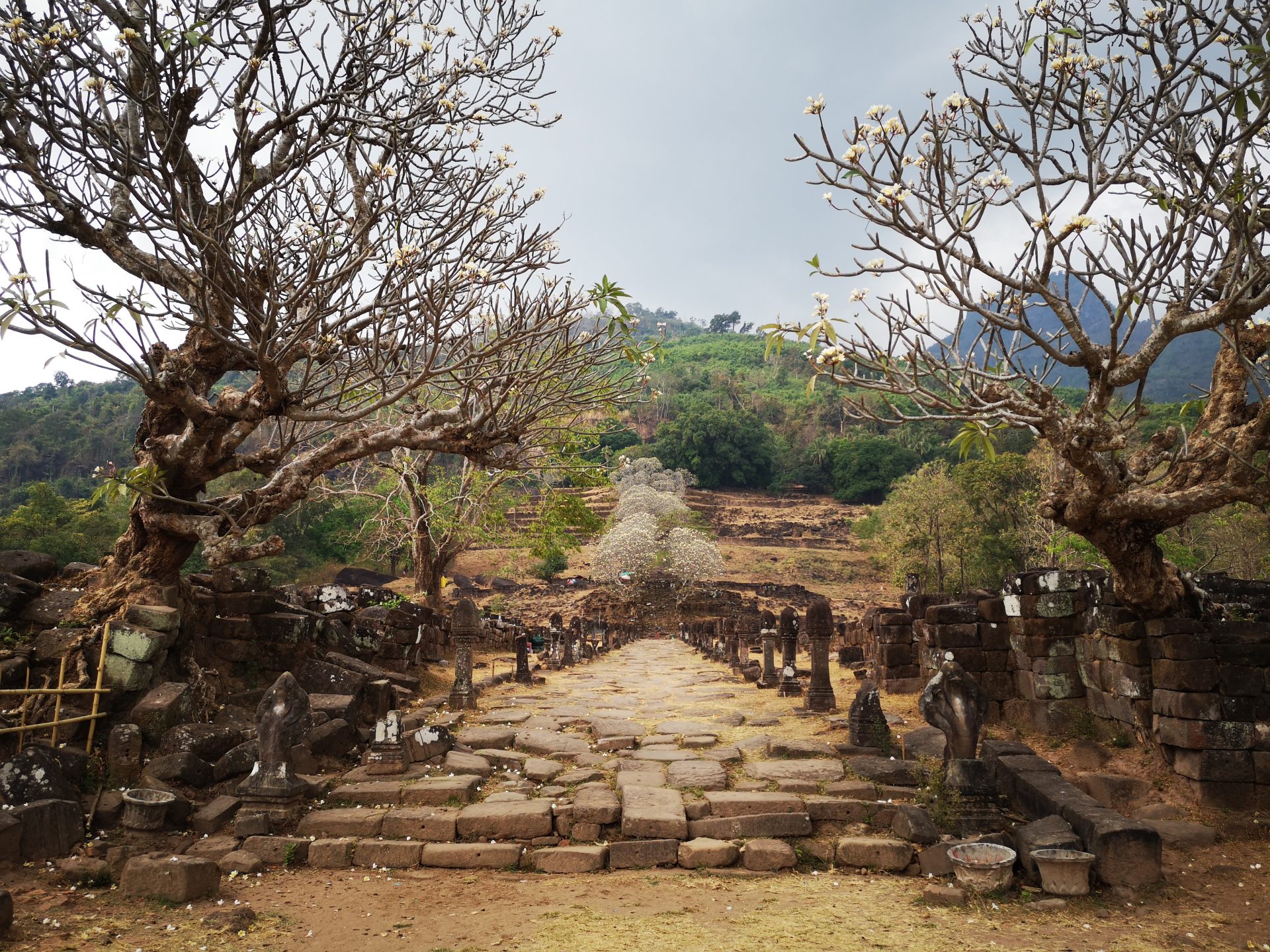
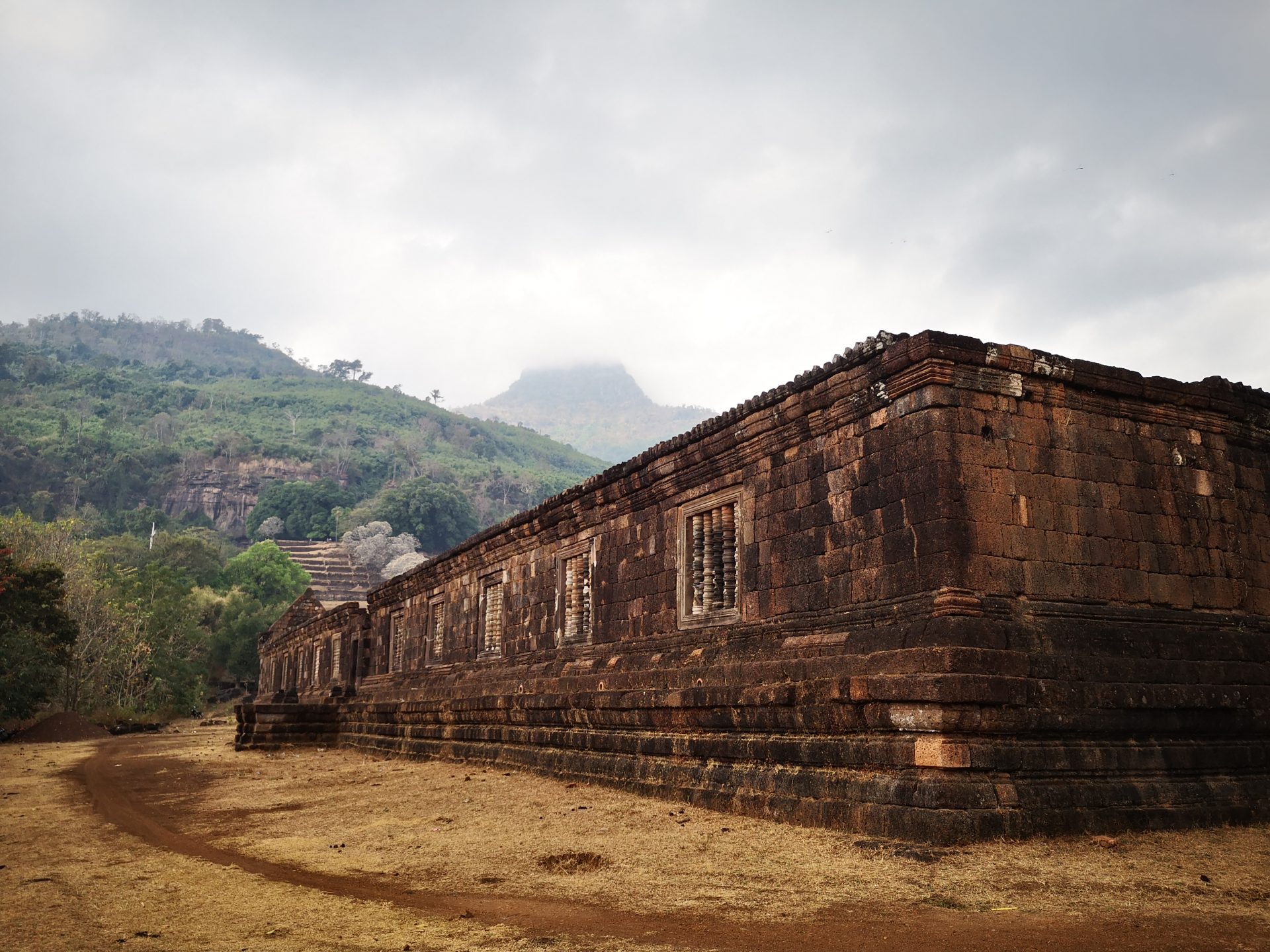
After two days we head further down river. This journey involves a pickup truck, a diesel powered longtail boat across the wide Mekong (with just a cheerful capable twelve year old boy called Nat at the helm), a bus ride and finally a taxi to our hotel on the island of Don Khong. It’s all done with the purchase of just one ticket and the system always seems to work. Jo says that the ticket vendors often don’t inspire confidence, the details are vague, but they do deliver. Don Khong is the start of the 4,000 Islands. Are there 4,000 of them? Possibly, but lots are not much bigger than a large plant pot.
We are staying at the Kongmany Colonial House hotel which is centred around an old house built in the French colonial style. Our room is on the first floor of the original old building. There are tall French doors at both ends of the room, leading out onto two separate balconies, one overlooking the very decent sized swimming pool, the other, over a garden of palms and flowering frangipani trees, and the Mekong river – which is very broad and slow flowing. The floors are dark teak boards and there’s a full size snooker table in reception. Somebody has kindly abandoned a paperback copy of Dissident Gardens by Jonathan Lethem in our room. It looks like a fine literary novel. We have been cycling but it was hot and dusty on the unmade road, particularly when overtaken by big trucks, so we’ve spent the afternoon by the pool and now on the terrace in the warm golden evening sun, overlooking the river. I must take a break from this blog and order a couple of dry martinis – January can be so tiresome. (Post blog note: there were no Martinis. In fact I couldn’t find anybody available with whom I could order anything! This can happen a lot. Or this: Can I order two Coca Cola’s please? Sorry we only do Pepsi. No problem, I’ll have two Pepsi’s please. Sorry all Pepsis gone! These little disappointments are always accompanied by a wonderful smile).
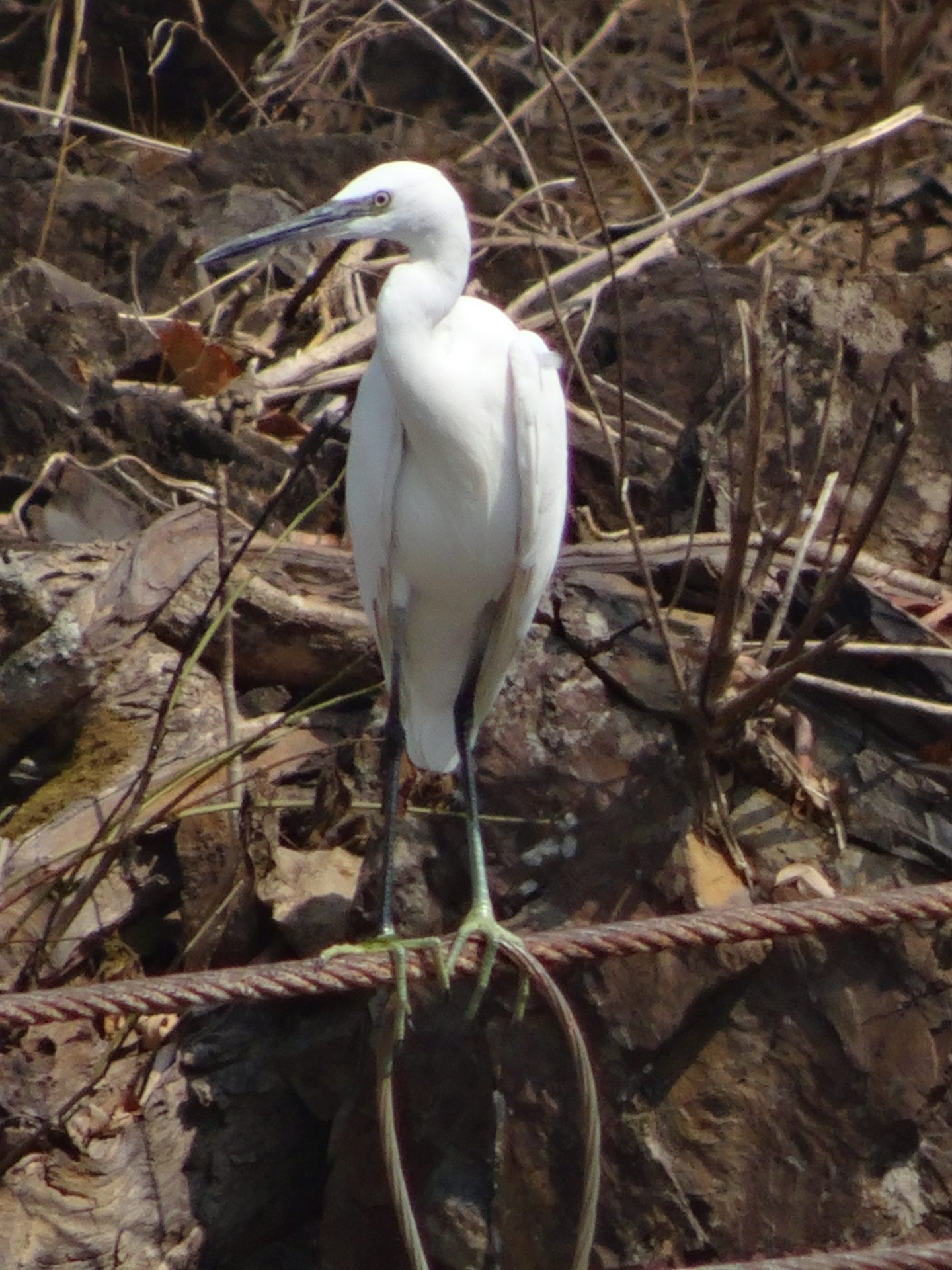

But we can’t dawdle in this charmed Somerset Maugham world. We are in a malaria zone which stretches from here to our destination, next week, in eastern Cambodia. We have only a couple of weeks supply of anti malaria pills and our Laos visa expires in six days so we have to keep going down river.
We take a slow longtail boat from Don Khong to Don Det. For the first time I see lots of birdlife on the Mekong. I spot a big flock (30+) of cranes, circling quite high then moving steadily down river till out of binocular sight. A fishing bird of prey with the markings of a buzzard. A dozen white ibis perched on a bushy shrub – looking like a cluster of big white flowers. Lots of cormorants and a few kingfishers. Hurtling towards us at great speed, casting a big arc of spray in his wake is an orange robed monk in a psychedelic longtail boat. More vroom than oommm I think to myself.
At the old French pier at Don Det we hire a tuk tuk to take us across the narrow concrete bridge to the island of Don Khon. The northern tip of Don Det is a place to party; marijuana, music and merriment. We’re staying on the more somnolent Don Khone for three nights. On the last two of these nights Jo has booked us into a surprisingly charming £9 a night Riverside bungalow where the seemingly rather gruff owner’s repose to every greeting or request is a short low level grunt – not rude so much as quite indifferent. It’s a residence of incidents. The owner tries to sell me some grass. A water buffalo In the river attempts to get at the woman owner’s runner beans and gets its head stuck in the fence in the process. She untangles him without feeble reticence. We swim in the Mekong – I use the word swim loosely – as we agree to keep mouths, ears and eyes out of the water. It looks clear and clean but so does hydrochloric acid and it’s too shallow or too fast running to allow more than a few strokes.
Over the next two days we ride, on bicycles, costing less then a pound a day, but in various states of decrepitude (who needs brakes?), around both of these islands, and it’s a great pleasure. There are no crowds – the islands seem to be geared up for many more visitors than are here – there is a Corona flu virus scare emanating from China and it’s been suggested that this is keeping visitors away from the entire sub continent.
The temperature at the opposite ends of the day is perfect and the winter light in the tropics is beautiful: the sun never too high in the sky so shadows abound. Even now in the dry season, the Mekong river cascades over rocky waterfalls and through deep canyons – it’s more like a series of parallel rivers flowing around the islands. We linger at the waterfalls and pedal slowly along the sandy tracks through the island homesteads. At the southern tip of Don Khong we order two iced coffees and sit at a railing high above the small dock, watching a small pod of Irrawaddy river dolphins through binoculars – they’re scarce and threatened with extinction but this pod has been living contentedly here for years. Our last two days in the country are marvellous. It’s a fitting end to our visit to Laos – a country we have both enjoyed so much.
We are on the wooden boat taking us to the small ferry terminal and bus station at Nakasong for our onward bus journey into Cambodia. With us is a couple from the Netherlands who have cycled from Amsterdam to Laos via eastern Europe, Iran, Russia and China. They’ve been on the road for almost a year – now that’s a bicycle ride! The guy’s back wheel is broken so they are having to take public transport to Phnom Penh where he thinks he can get a replacement. They are having bad luck today for, despite having paid a supplement for the shipment of their bikes, the bus company officials tell them that it is not possible to get the bikes onto a bus at the border. They are both mightily frustrated and we have to leave them behind. We have their contact details and we’ll find out what happened.
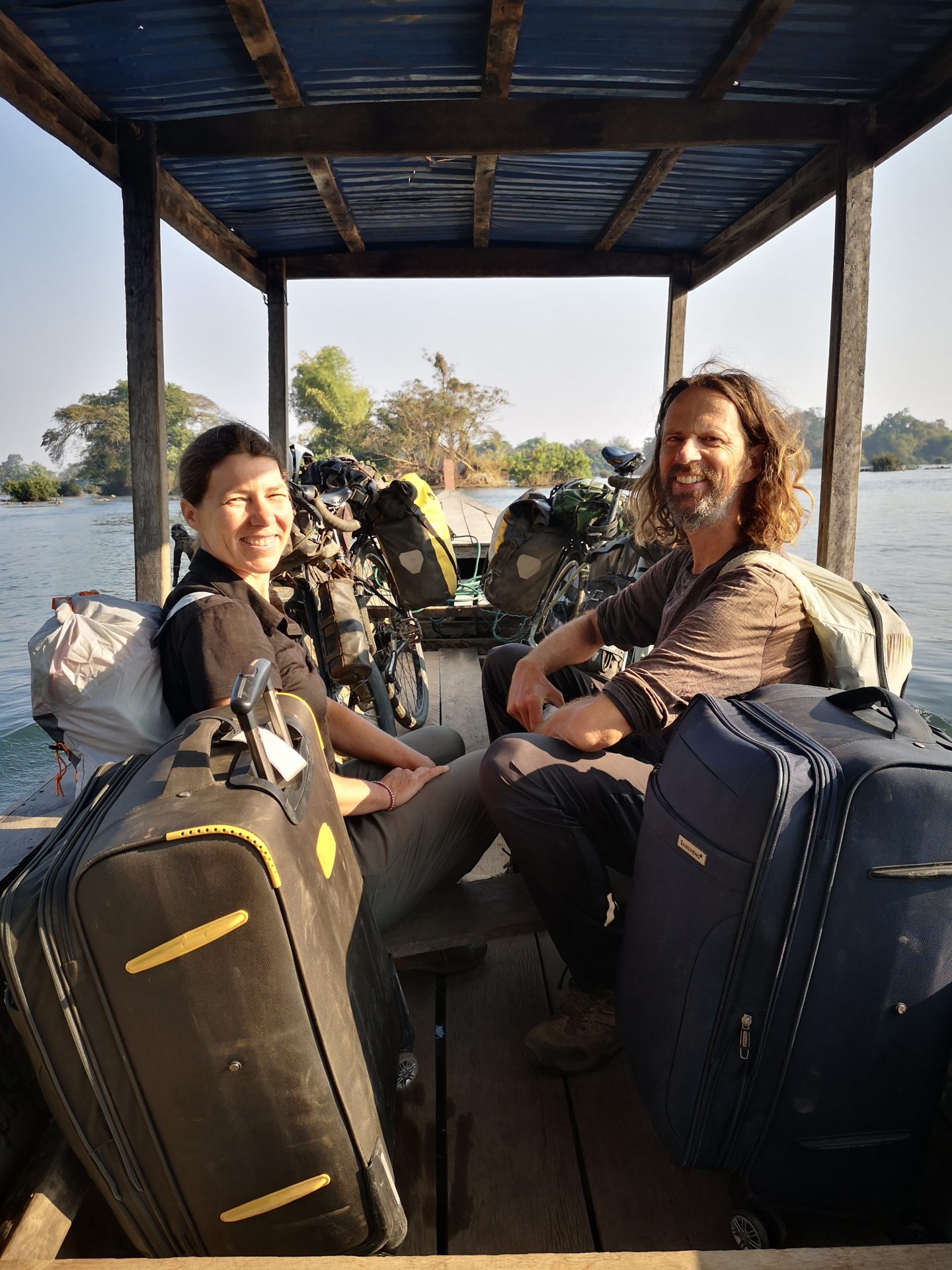
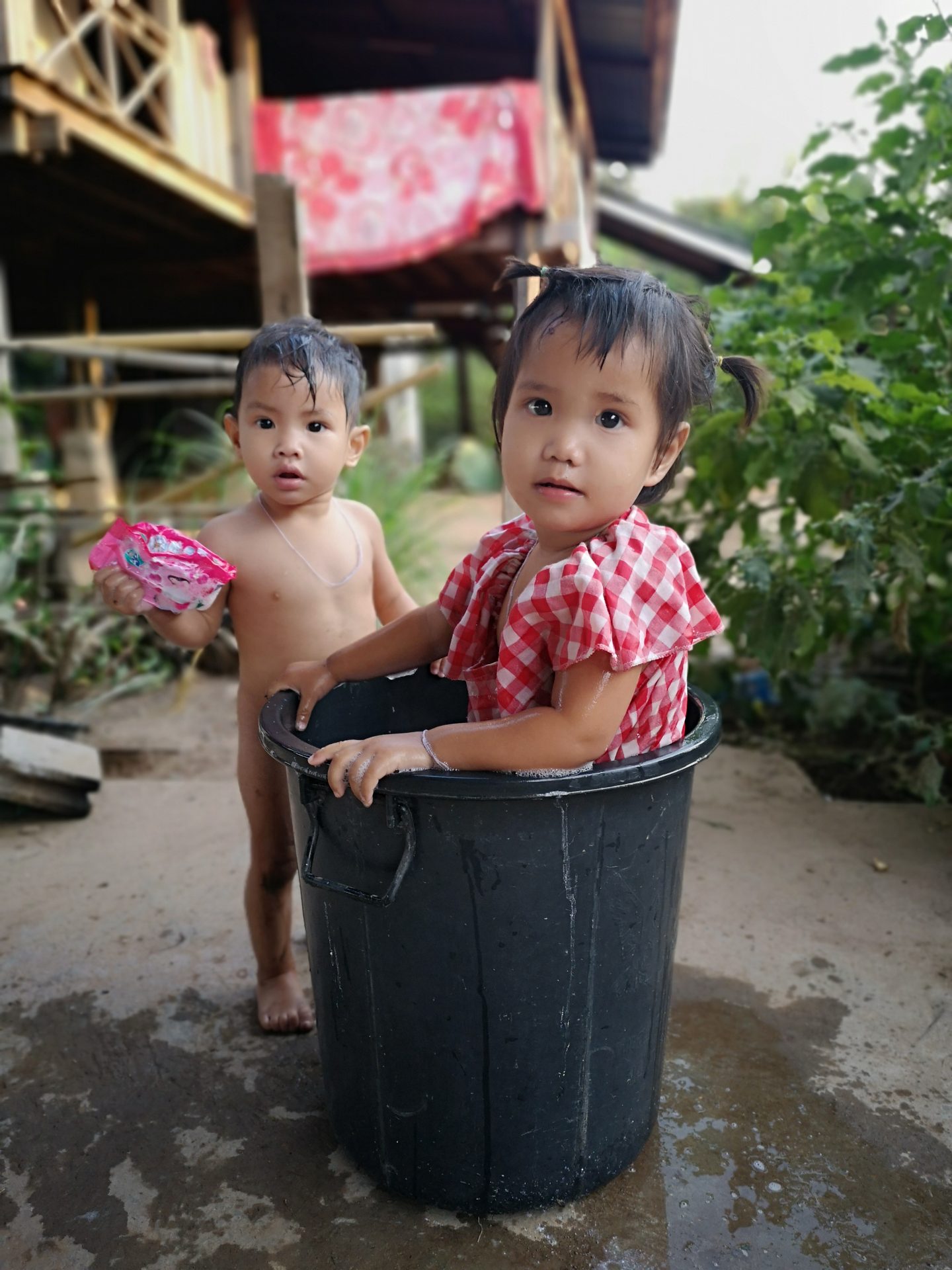
Long Distance Cyclists From Amsterdam
A Toddler in a Bucket
The big border crossing at Tropeng Kreall looks like a deserted film set – grandiose border post buildings, vast empty car parks, no cross border commercial or private vehicles, just us, a small busload of tourists. We’ve bought 35 dollar e-visas up front but there are plenty of officials ready to fleece us of seven more dollars. Then we must walk across the sandy expanse of no man’s land into Cambodia.
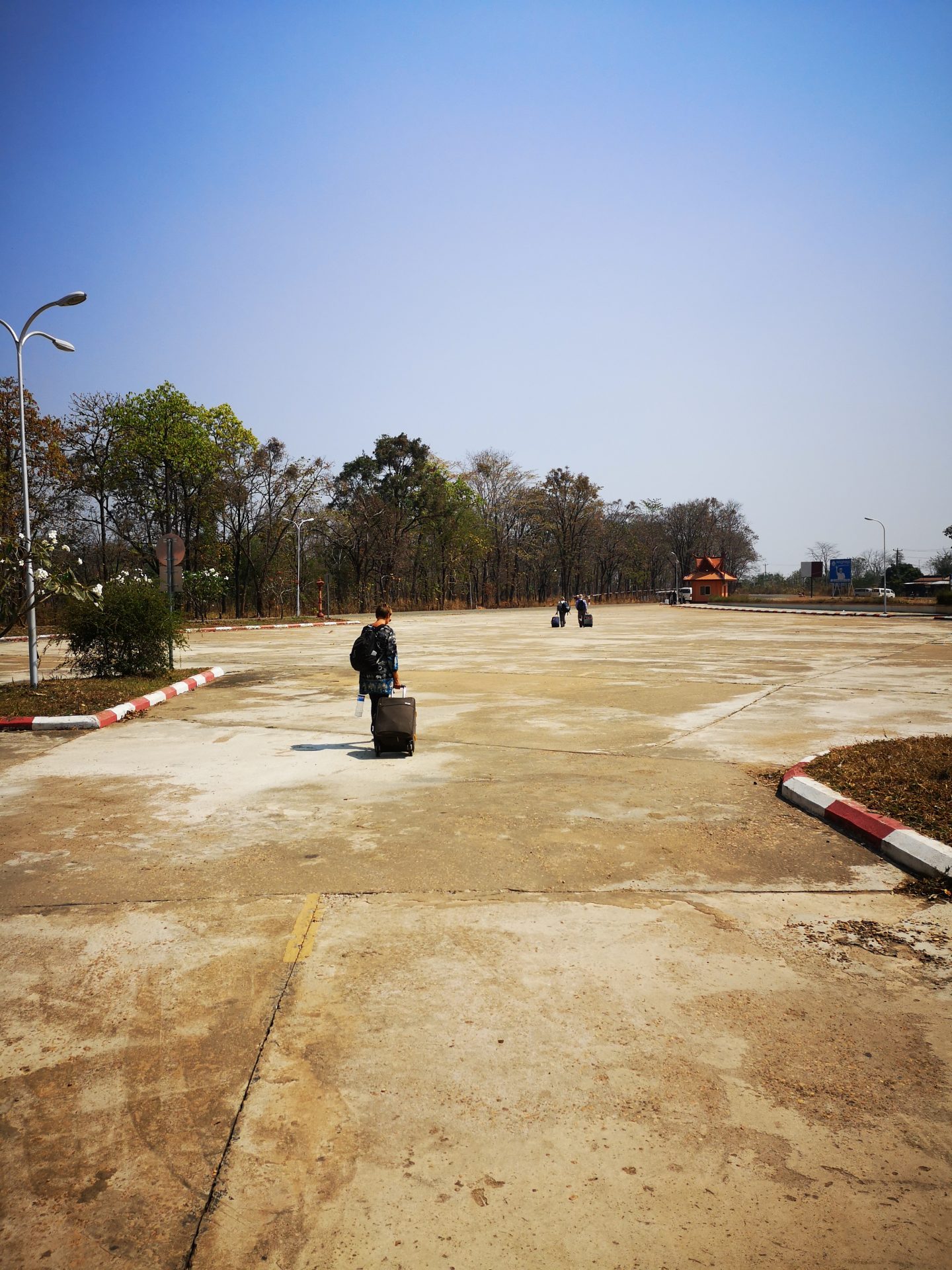
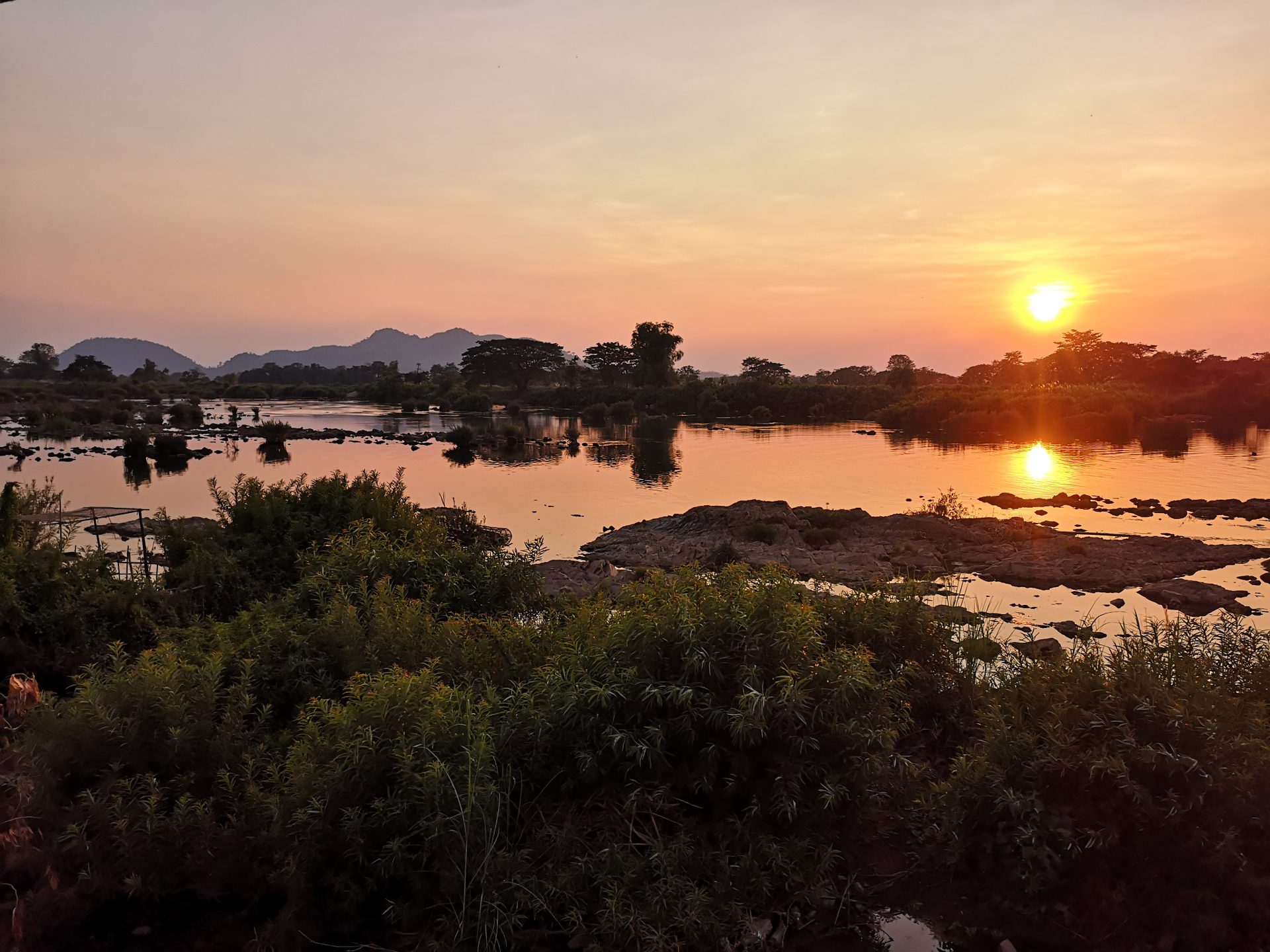
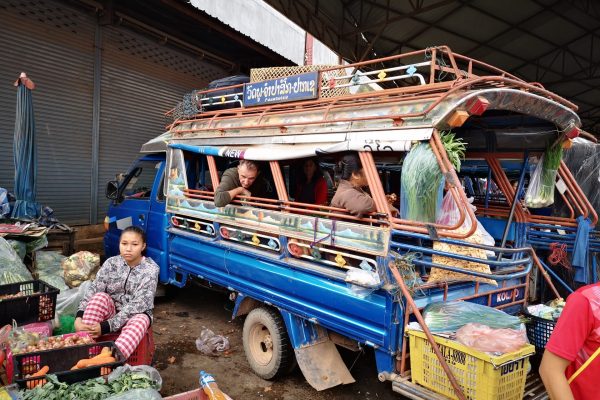
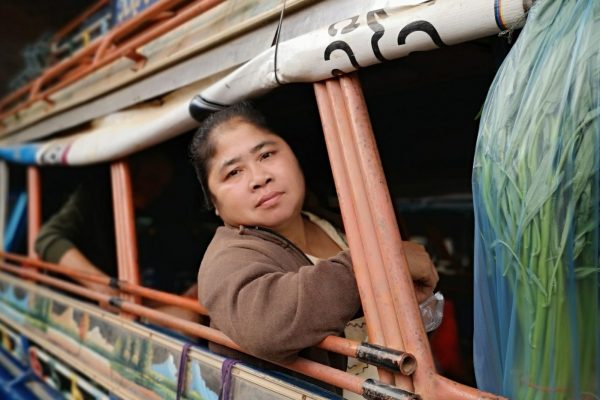
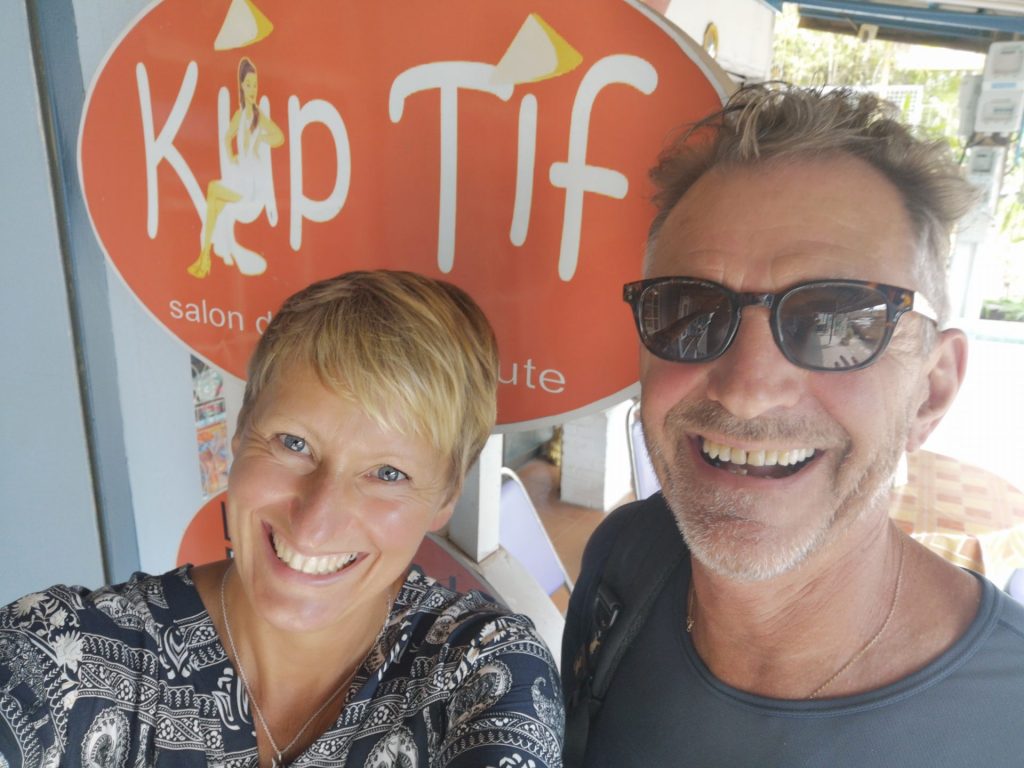



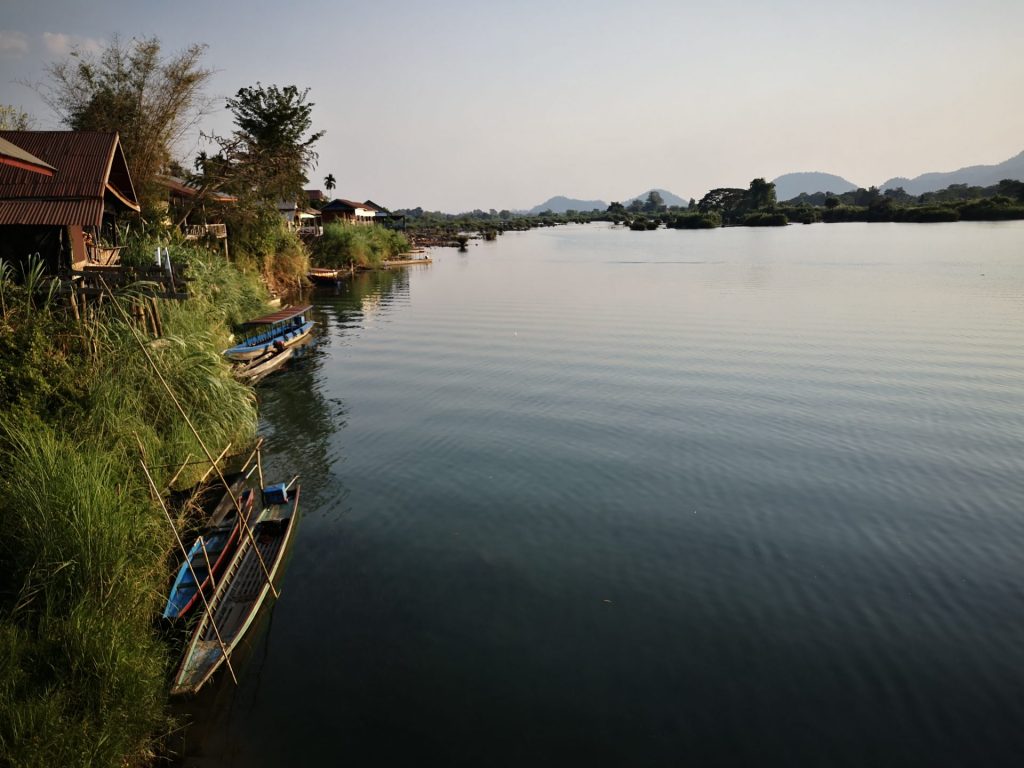


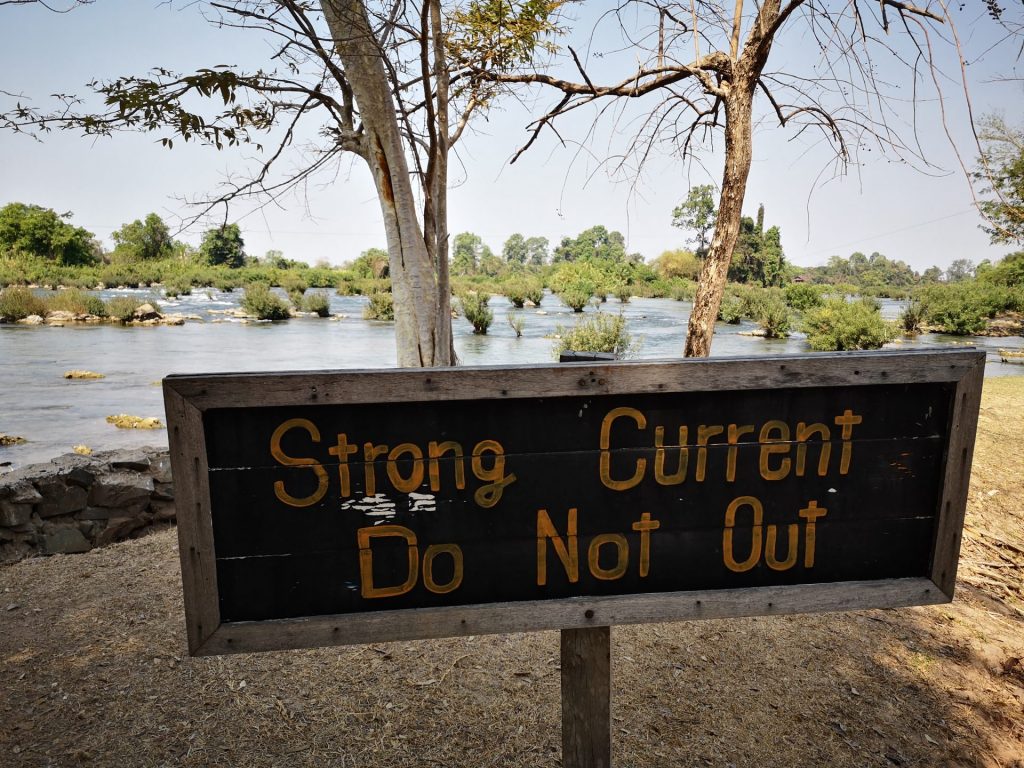
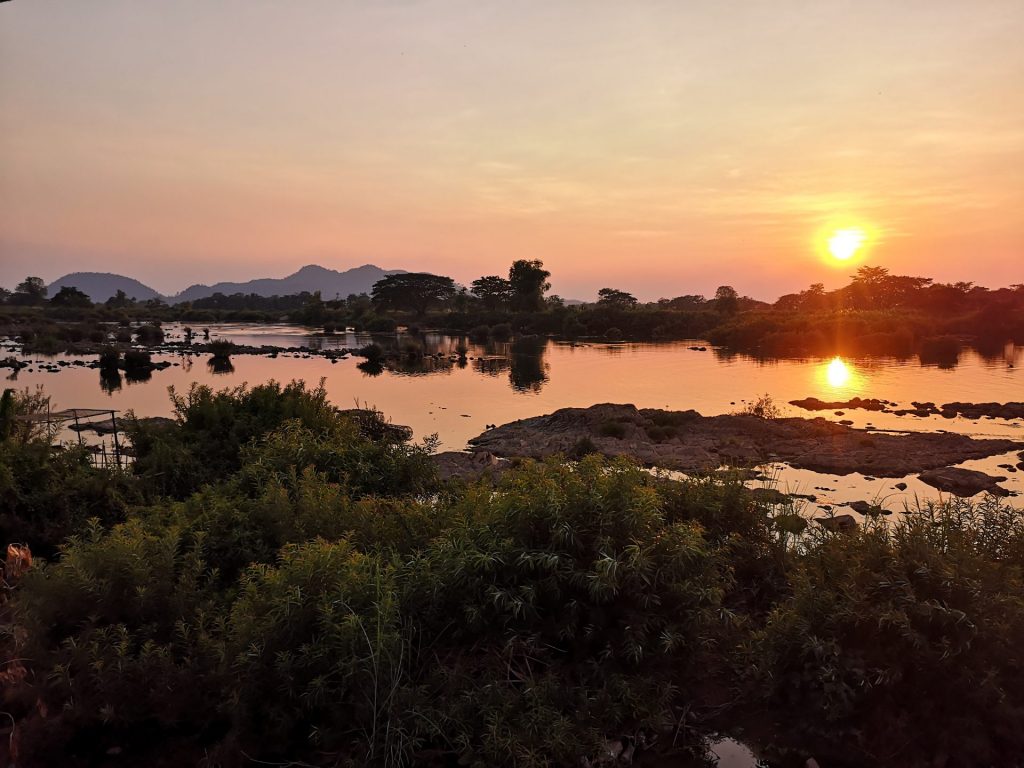
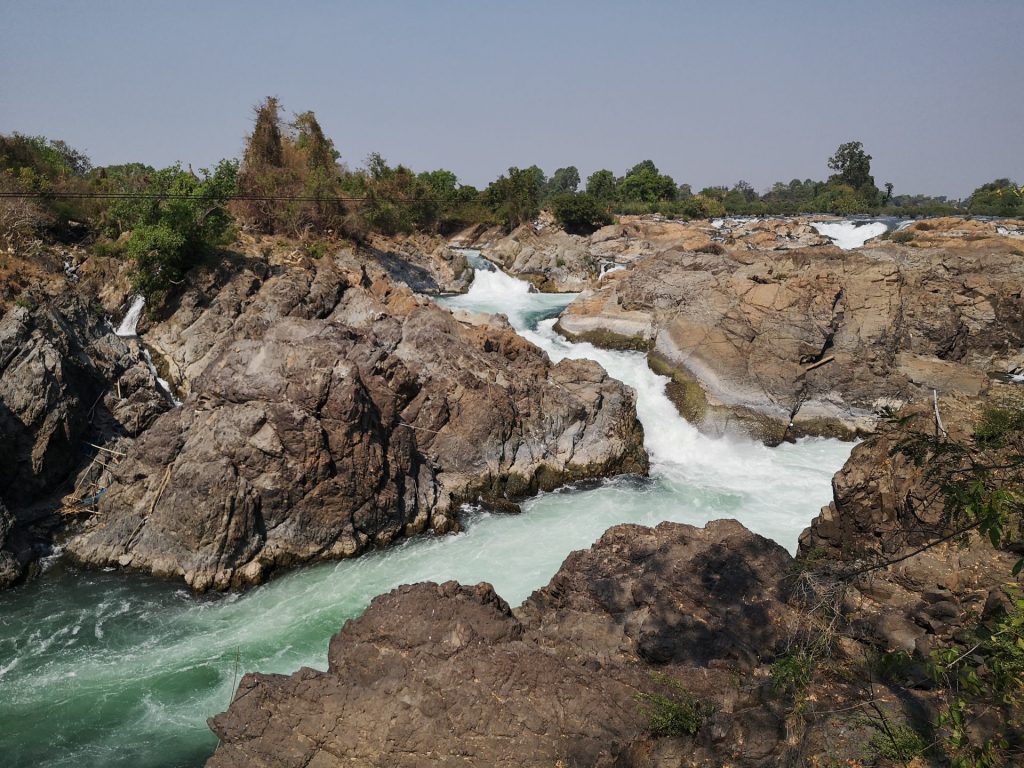

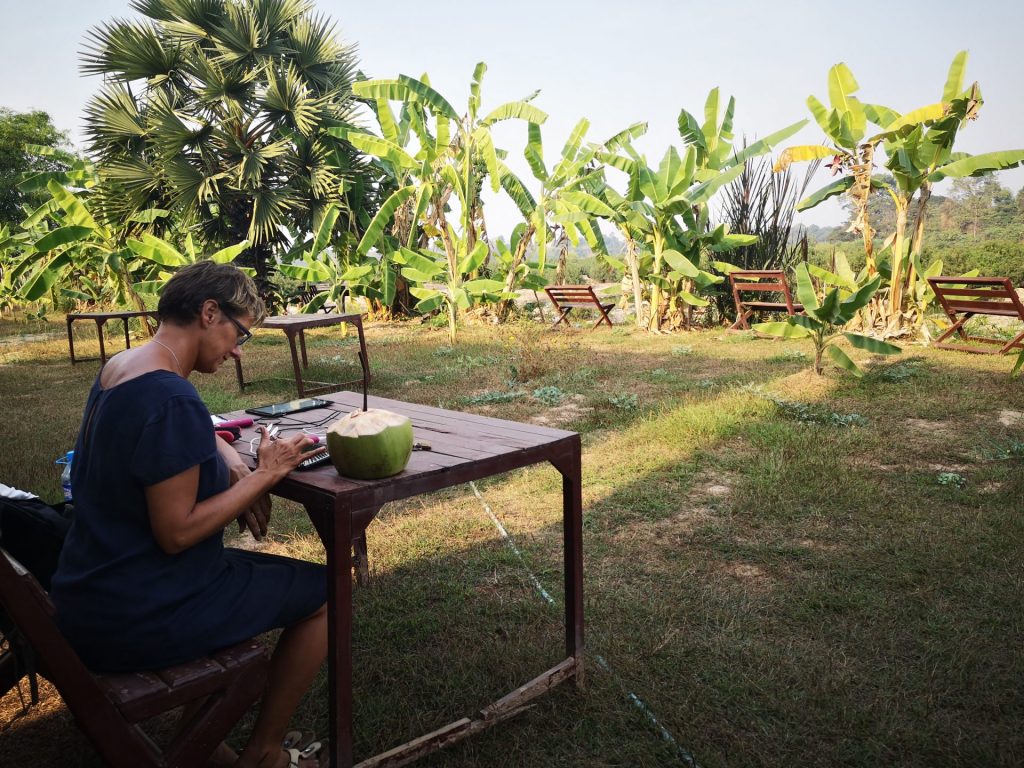
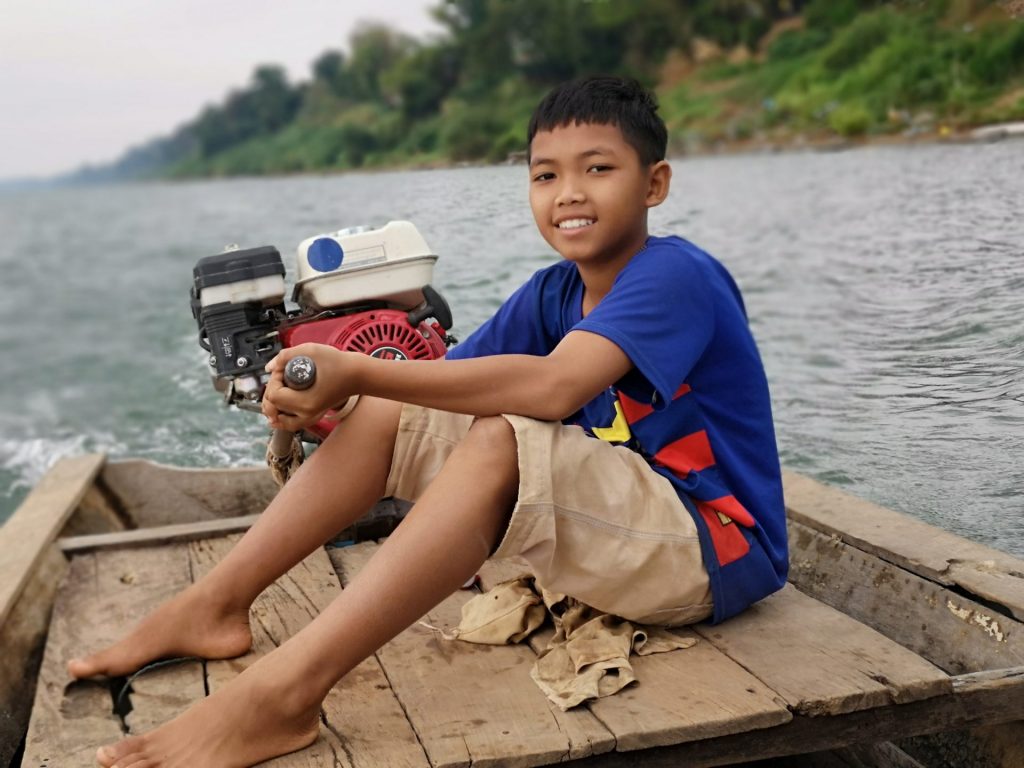

Really enjoyed reading this .beautiful photos love to you both